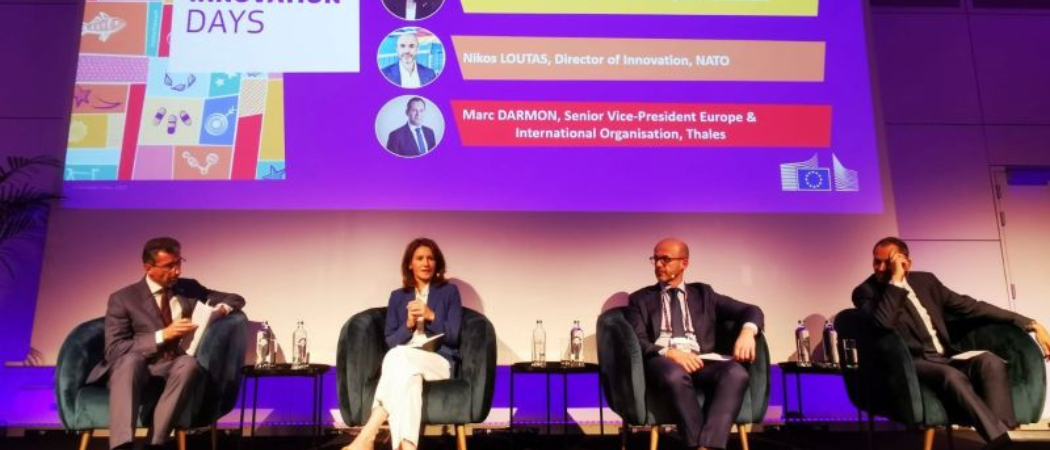For some MEPs defence-linked research is imperative, for others a threat to openness, academic autonomy and simplification

From right to left: Marc Lemaître, director general for research and innovation, MEP Eszter Lakos, Nikos Loutas, NATO’s director of innovation, and Marc Darmon, senior vice president at Thales. Photo credits: Eszter Lakos / LinkedIn
Divisions are growing within the European Parliament over plans to let research and innovation projects with civilian and defence applications apply for funding in the next EU Framework Programme. Under the present programme, such dual-use projects have been excluded.
For Eszter Lakos, a European People's Party (EPP) MEP who sits on both the research and defence committees, dual use is a “necessity” and an “imperative,” deserving stronger investment.
“The question is not whether Europe is going to go for dual use, but how it is going to do that,” Lakos said at the European Commission’s Research and Innovation Days conference in Brussels on September 16.
She went on to call for the development of a specifically “European way for dual use,” and pointed to the next Framework Programme and the European Competitiveness Fund as providing “the right setup” and “the right resources” for this shift in emphasis.
On July 17 the European commissioner responsible for research, Ekaterina Zaharieva, confirmed that dual use projects will be supported across the next Framework Programme. Previously, the Commission had suggested that only the European Innovation Council (EIC) would be exempt from a rule that insisted only research with civil applications can win EU funding.
“After 40 years of a purely civilian focus in research and innovation, it’s time for Europe to broaden its perspective,” Lakos said after the event, urging the EU to adopt a “more integrated approach.”
But not everyone in the Parliament shares this enthusiasm. In a recent interview with Science|Business, René Repasi of the Socialists and Democrats group warned that incorporating dual-use research into the Framework Programme could undermine openness, academic autonomy and simplification.
He cautioned that such projects risk bringing heavy restrictions, from confidentiality requirements to limits on the participation of third-country researchers, as well as additional bureaucracy, clashing with the EU’s tradition of open, collaborative science. Repasi’s concerns have been echoed by Christian Ehler of the EPP, who was rapporteur on the current Framework Programme, Horizon Europe.
The push for dual use projects is backed by significant funding under the Commission’s proposal for the next long-term EU budget, released in July. The defence and space window of the European Competitiveness Fund will channel €131 billion into defence, security and space projects..
Meanwhile, EU member states are shaping their positions on dual use alongside broader defence planning. With initiatives such as the Commission’s Rearm Europe and NATO’s 5% GDP pledge, covering 23 EU members, governments are directing significant resources toward defence and security. These funds also open the door to dual-use research.
Eva-Maria Holzleitner, Austria's research minister, said at the conference that she wants to build a “coalition of like-minded countries” that want EU funding to focus on “peace-related research,” as she euphemistically called dual-use projects.
Related articles:
- FP10 should focus on ‘dual-use by design,’ Commission advisory group says
- Viewpoint: dual-use innovation, a strategic choice for Europe
- Universities not in favour of dual-use research
Dual use as essential
Speakers at the event agreed that geopolitical tensions and rapid technological advances make embracing dual use unavoidable. According to Lakos, dual use lies at the heart of the current geopolitical context.
“Who is winning the technological race is going to dominate also in the military domain,” she said. “So, it is geared around our strategic autonomy in order to be able to defend ourselves.”
NATO’s director of innovation, Nikos Loutas, noted that while military programmes once drove breakthroughs, innovation today largely comes from civilian ecosystems.
However, the war in Ukraine, he said, has shown how quickly and cheaply dual-use technologies can be adapted to the battlefield, making them essential for future military capabilities.
Lakos noted that the US has decades of experience in dual-use research. Europe is only now catching up and must invest more decisively. However, the MEP called for an ethical and collaborative approach to dual use in the EU.
“The Americans like to say peace through strength, but I would say credible deterrence,” she said.
Lakos also pointed to China’s recent rise in the UN innovation ranking, overtaking Germany, as a warning sign that Europe risks falling behind.
Editor's note: This article was updated 23 September 2025 to correct the title of Eva-Maria Holzleitner. She is Austria's research minister.





 A unique international forum for public research organisations and companies to connect their external engagement with strategic interests around their R&D system.
A unique international forum for public research organisations and companies to connect their external engagement with strategic interests around their R&D system.